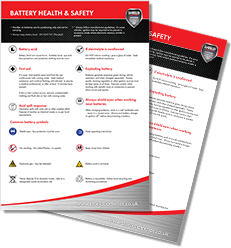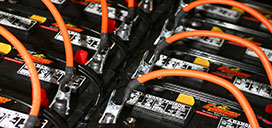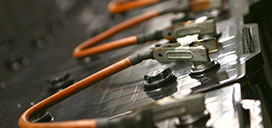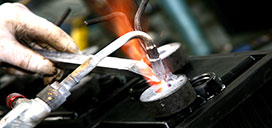Be safe around batteries
As with all potentially dangerous items, the golden rule is “if unsure – seek professional advice”
The following is a non-exhaustive list of good practices when handling secondary batteries.
- Consult your vehicle, equipment and battery owner’s manuals for instructions and safety precautions.
- Wear approved safety glasses or goggles.
- Wear proper clothing to protect your hands and body.
- Make sure the work area is well-ventilated.
- Remove all metal jewellery before working on or near a battery and never allow metal tools or vehicle components to come into contact with the battery terminals.
- Never lean over a battery while boosting, testing or charging.
- Keep away from cigarettes, flames, sparks and other ignition sources – they can cause a battery to catch fire or explode.
- Always shield eyes and face from a battery.
- Do not charge or use booster cables or adjust post connections without proper instructions and training.
- Do not allow battery electrolyte to come into contact with fabrics or painted surfaces. If battery electrolyte comes into contact with any surface, the surface should be washed down immediately with copious amounts of clean water.
- KEEP BATTERIES LEVEL. DO NOT TILT.
- Handles on batteries are for positioning only and not for carrying.
- In event of an accident, flush with water and get medical assistance immediately.
- KEEP OUT OF REACH OF CHILDREN.
Battery Electrolyte contains sulphuric acid, which cause burns to skin and eyes. We suggest you wear suitable eye protection and gloves when handling batteries.
Material Safety Data Sheets
MSDS: Valve Regulated Lead Acid (VRLA) Batteries
UNPACKING A BATTERY
Ensure that you open any packaging on a flat surface and in a well ventilated area. Open the carton and remove any filling. Be very aware of any liquid in the packaging. If you suspect a spillage – seek advice immediately. DO NOT PLACE ON ANY SURFACES SUCH AS CARPETS, WOODEN FLOORS or SINKS, AVOID CONTACT WITH CLOTHES AND SKIN. Do NOT continue to unpack the battery and continue to avoid contact with skin, clothes, carpets, floors etc. If you have the fluid on your skin, you MUST rinse the affected area thoroughly. As far as you are able, check the battery for signs of any physical damage. If the battery has leaked, there will almost certainly damage to the battery box. If the breather plugs are missing, the fluid might have escaped from there.
HANDLING A PALLET OF BATTERIES
Ensure that the correct lifting equipment is used for handling pallets of batteries. Batteries are very heavy. Be careful not to pierce batteries with forklift or stacker arms - If you do, alert the appropriate authority immediately. If you suspect a spillage or a leak from the pallet, alert the appropriate authority immediately. If a pallet is dropped from height - alert the appropriate authority immediately.
Battery Safety Symbols

Take note of the information on the battery, the instructions for use and the operating instructions of the vehicle.

Wear eye protection.
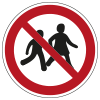
Keep children away from acid and batteries.
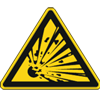
Explosion danger:
- A highly explosive oxyhydrogen gas is emitted during battery charging therefore:
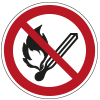
No naked flames, sparks, naked lights or smoking:
- Avoid sparking when handling cables and electronic devices.
- Avoid short circuits.
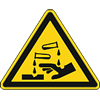
Chemical burns danger:
- Acid is highly caustic therefore:
- Wear gloves and eye protection.
- Do not tilt the battery, as acid could spill out from the degassing vents.
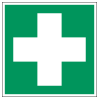
First Aid:
- If acid splashes into the eyes rinse immediately with clear water for several minutes. Then consult a physician.
- If acid splashes onto the skin or clothes neutralise immediately by using an alkaline solution or soap and rinse with large amounts of water.
- If acid is swallowed consult a physician immediately.

Warning:
- Do not expose batteries to direct sunlight without protection.
- Always store batteries in a frost-free area, as discharged batteries can freeze.

Disposal:
- Hand in used batteries at a collection centre. During transportation take note of the instructions contained in Item.
- Never dispose of old batteries with domestic waste.
Battery Health & Safety PDF to Download
